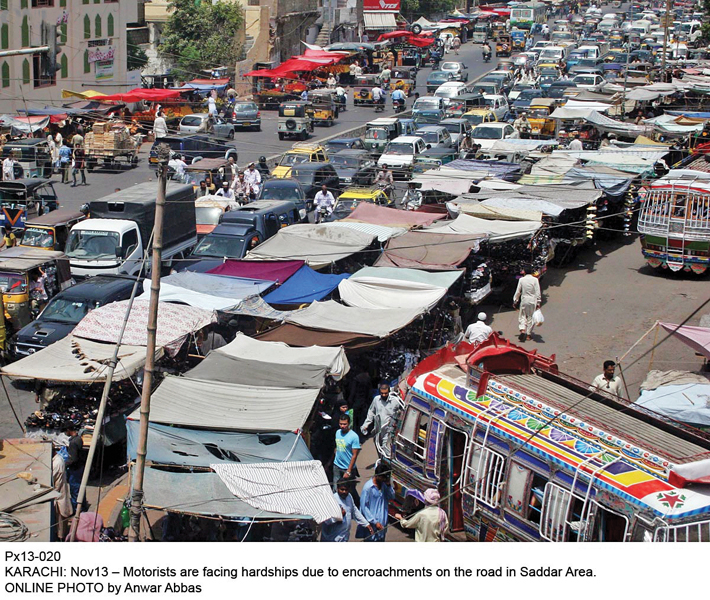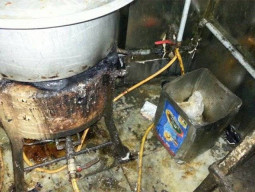
Selling fruits and vegetables may not be risky business otherwise but it is for Saddar’s roadside vendors.
The traders have to pay bribes to the various political parties who claim ownership of different roadsides and then deal with the consequences of frequent clashes between rival groups. Each day at the job, they wait with bated breath, careful not to ruffle any feathers.
“If you are selling something on the pavement near Rainbow Centre, make sure you know that someone has their eyes on you,” said a resident of the same area, Faizan Ahmed. “You will have to pay at least Rs200 for your own safety and that of your valuables.”

According to a DSP, who was deployed at the nearby Preedy police station sometime ago, told The Express Tribune on the condition of anonymity how the area is divided. One side of the pavement from Rainbow Centre to Chaudhry Farzand Ali Kulfi Wala comes under one armed group that is responsible to collect extortion from all shopkeepers along the kerb. Another group takes control of Bohri Bazaar, Karim Centre and Co-operative Market. Yet another one managed Regal Chowk and adjacent areas.
For Saddar SP Salman Hussain, the root of every problem is encroachment. Illegal occupation of government lands, traffic jams, terrorism threats, armed clashes and land grabbing are all because of encroachments, he said. “We suggested the Karachi Metropolitan Corporation (KMC) to set up camps and install barbed wires in the vicinity but, within a few hours, armed groups took over and the roadside business was thriving again,” he said.
This turf war over roadside stalls is the main cause of violent conflict, said DIG Javed Odho. “Political groups often blame rival parties for target killing when, most of the time, the fight is over land and installing makeshift stalls,” he explained. In fact, one such clash on December 22, 2012, claimed five lives.
The political parties do, however, deny they have links to these ‘mafias’. “It is the responsibility of the law enforcement agencies to arrest corrupt people,” said a local political leader. “Real activists can never be involved in bhatta collection.”
Negotiating bhatta ‘rates’
The owner of a makeshift stall, Hameed Khan, has a different story to tell. “During a recent encroachment drive in Saddar, the authorities confiscated my stall,” he said. “The next day, I set up a new cart and installed it at the same location but now the armed groups were demanding twice the extortion.”
From paying Rs200 a day to do business in the area, Khan was now being asked to pay Rs400 to these groups. “The city administration earns lucrative income from taxes but it has given permission to armed groups to keep their hold over these busy areas and collect ‘bhatta’ from encroachers, businessmen and factory owners,” claimed the president of Karachi Tajir Ittehad, Atiq Mir.
“KMC and the law enforcement agencies’ ‘fake’ anti-encroachment drives are nothing but an attempt to increase ‘bhatta’ rates of armed groups and corrupt officials,” he added.
Surprisingly, the KMC’s anti-encroachment call director Mazhar Khan agreed that such drives are not effective.
“When we are done with our job and leave the area, these armed groups establish their illegal encroachments once again,” he said.
CDGK’s makeshift stalls - an eye sore, a nuisance
During the tenure of General (retd) Pervez Musharraf, the city government had established its own makeshift stalls and rented out several pavements in the city to encourage people to switch from open carts to enclosed shops. The union councils auctioned these stalls, worth Rs300,000, and rented them for a meagre Rs500 to Rs100 a month.
According to Karachi Tajir Ittehad president Atiq Mir, this was also a kind of encroachment that took place with the permission of former city nazims Niamatullah Khan and later Mustafa Kamal. “By setting up these stalls, the government ruined the businesses of real tax payers and violated the rights of pedestrians,” Mir pointed out.
Published in The Express Tribune, February 7th, 2014.
COMMENTS (1)
Comments are moderated and generally will be posted if they are on-topic and not abusive.
For more information, please see our Comments FAQ




1732626034-0/BeFunky-collage-(92)1732626034-0-165x106.webp)












I am a frequent visitor of these stalls, these guys at times have some good stuff which comes at a low price. Just a small comment on this article "It takes two hands to clap"